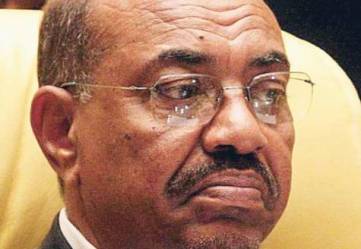Bashir makes rare admission of “bloodshed” & “injustice” in Sudan
July 22, 2013 (KHARTOUM) – Sudanese president Omer Hassan Al-Bashir has given an unusually candid assessment of the situation in his country, expressing regret over the prevalence of bloodshed in Sudan and even appeared to be holding himself personally responsible.

“We know that the destruction of the Ka’aba [in Mecca] is lesser [in gravity] in the eyes of god than the killing of a [human] soul”, he added.
The Sudanese president stressed that people get punished in this life for all sins they commit except murder which has its retribution saved for the day of judgement.
The veteran Sudanese general, who has ruled Sudan for 24 years since staging a coup in 1989, also said that the “injustice” shrouding the country resulted in drought and lack of rain.
“How can we ask for mercy [from god] when our hands are covered in blood?”, Bashir said.
Addressing the growing trend of tribal conflicts in Darfur, he urged the Darfurians present to raise their hands and swear an oath to seek peace in the troubled region.
“Swear and say we are for peace and against war. […] We do not want anyone from outside advising us. We will solve our own problems”, he said.
Bashir said that the reasons behind the killings in Darfur do not even warrant slaughtering a sheep let alone a human being and vowed that an upcoming tribal reconciliation conference will come up with real solutions.
The out-of-the-ordinary statements by Bashir represent a stark departure from his usual fiery speeches in which he often strikes a challenging and threatening tone towards his opponents and to western nations alike, which he claims are working to topple his regime.
Throughout his two-decade rule, Bashir has managed to weather a major civil war with what is now independent South Sudan, multiple rebellions that continue until this day, US sanctions and most recently an International Criminal Court (ICC) arrest warrant alleging that he orchestrated war crimes and genocide in Darfur.
The conflict erupted in the western region of Darfur in 2003, when ethnic African rebels rose up against Khartoum, complaining of discrimination by the Arab-dominated government.
Khartoum responded with a military crackdown and is accused of unleashing Arab militias known as Janjaweed, which have attacked ethnic African villages, killing, raping and looting residents, according to United Nations reports.
While Khartoum’s human rights record has always drawn condemnation since Bashir came to power over its brutal suppression of dissent, the Darfur conflict created a headache for the Sudanese government which has sought tirelessly to label it as a manufactured and exaggerated crisis.
Bashir himself has vehemently denied any mass killings in Darfur and continuously asserted that no more than 10,000 were killed since the violence broke out a decade ago, out rightly rejecting any responsibility for the deaths.
The UN estimates that 300,000 people were killed in the course of the Darfur conflict, while more than 2 million civilians were displaced.
Even though the violence in Darfur has ebbed from its 2003-2004 peaks, violence between the army, rebels and rival tribes has recently intensified, displacing some 300,000 people since January of this year.
(ST)
